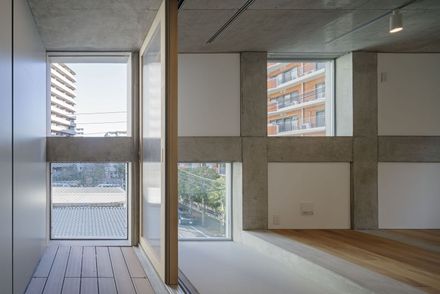Hatsuse Mita Apartments
ARCHITECTS
Ihrmk
REPRESENTATIVE
Ihara Masaki, Ihara Kayo
STRUCTURE ENGINEER
Asa
CONSTRACTORS
Shin
PERSON IN CHANGE
Ono Kojiro
MANUFACTURERS
Abc Trading, Aica, Nippon Paint, Toli, Dainichi Giken Kogyo, Forbo, Koa Tsusho, Sankyo Tateyama, Takei Kogyo, Toa Cork
PHOTOGRAPHS
Inatsugu Taisuke
AREA
852 M²
LOCATION
Minato City, Japan
YEAR
2019
CATEGORY
Apartments, Residential
A big house. An owner-occupied rental apartment building typically has its owner’s penthouse above the rental units.
Hatsuse Mita is also an owner-occupied property with several rental units, but its spatial organization is much different.
The owner's family was forced to move out of their former residence due to the area's redevelopment project and they needed a new home that can adapt to changes in their family structure and society.

So instead of a residence for the whole family to live together, we proposed a plan in which every unit has a unique floorplan and can be offered as a rental unit or treated as an "individual room" of the family's residence.
In this non-hierarchical plan, the family can move from one unit to another, depending on the type of space they need at the time of transition in the future.
Private and communal spaces are neither closed off nor open to each other but organized as edge pieces of a broken line.
Hatsuse Mita is a "big house" in the sense that occupants can maintain the same privacy and intimacy level that the family enjoyed in their former home.
"Meguri-doma (a covered stairwell / common corridor)" is designed to hold sunlight and allow the breeze to flow through the inner terraces and living spaces.
The site is situated amongst large-scale residential buildings along a major road and an area of low-rise wooden houses.
Considering the high contrast of texture and sizes between these two areas, we gauged an intermediate structural scale: a frame built with 310mm square columns placed 1350mm apart.
"Open terraces, " "Inner terraces, " and "Living spaces" are placed around it in various patterns to mix inside and outside throughout the structure.
There is a bench in every landing area, which suggests alternative use of the space as a second living room or a study space.
Private and communal spaces are neither closed off nor open to each other but organized as edge pieces of a broken line.
Hatsuse Mita is a "big house" in the sense that occupants can maintain the same privacy and intimacy level that the family enjoyed in their former home.
Thirteen apartment units in various shapes, along with the shared spaces, form a multi-faceted volume.
Allowing residents to find a suitable space in the building for what they need at a particular moment.








































